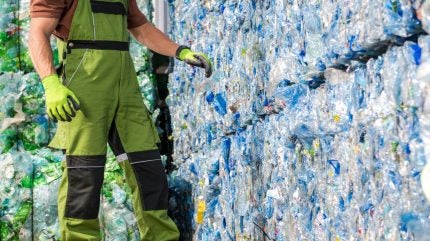
Sustainability advisory and investment company Systemiq has published a comprehensive study with support from Closed Loop Partners, Eunomia and The Recycling Partnership to achieve several key environmental and economic goals in the US.
Titled ‘Transforming PET Packaging and Textiles in the United States’, the study highlights a detailed roadmap to transition the US PET packaging and polyester textile industries to circular, low-waste, and low-emission systems by 2040.
The study also emphasises the urgent need for a shift from the current linear single-use model, which is unsustainable and contributes significantly to pollution and greenhouse gas (GHG) emissions.
In addition, the study includes strategies to reduce material use, scale packaging reuse, textiles resale, and expand recycling.
The emerging technology of depolymerisation recycling is highlighted as a promising method to recycle polyester textiles and harder-to-recycle PET packaging into virgin-quality materials, reducing fossil fuel reliance and emissions.
By 2040, the implementation of these measures could significantly increase recycling rates for PET packaging to 70% and polyester textiles to 19%, halve virgin consumption and waste, and cut GHG emissions for packaging by approximately 60%.
PET packaging and polyester textiles, which include products such as beverage bottles, food trays, and garments, represent 30% of the US plastic packaging and textile consumption.
The study’s release coincides with significant policy developments aimed at tackling plastic pollution, including the Responsible Textile Recovery Act of 2024 in California and the Executive Order on Mobilizing Federal Action on Plastic Pollution.
Additionally, extended producer responsibility (EPR) laws have been enacted in five states, with ten more considering similar legislation.
With more than 100 billion PET bottles and ten billion polyester garments used annually in the US, the study warns that if current trends persist, consumption will grow 1.5 times by 2040, leading to 13 million metric tonnes of waste and over a twofold increase in greenhouse gas emissions from domestic production.
This transformation could also create 46,000 additional direct US jobs and generate $4.9bn per year in additional revenue for the recycling industry.
Collaboration between government, industry, and investors is deemed essential to deploy new and proven technologies such as AI-based waste sortation and depolymerisation recycling, at scale.
The Recycling Partnership chief policy officer Kate Davenport said: “For the US to fully realise the potential of a circular economy for PET and polyester, it’s vital for state and federal policymakers to implement ambitious legislation including well-designed EPR.
“Strong public-private partnerships and clear regulatory frameworks are essential to deliver the infrastructure, attract targeted investment and scale the change required to build a better recycling system.”
The study, guided by an independent Steering Group with representatives from various sectors, was commissioned and funded by Eastman, who participated in the Steering Group.







